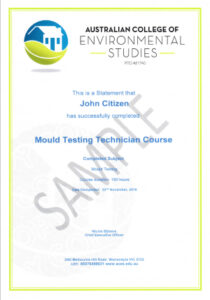
The Mould Testing Technician unit (10913005NAT) is the only nationally accredited training program in Australia for certifying mould assessors. This comprehensive course has been designed to cater to a diverse range of professionals, including building managers, tradespeople in the building and construction sectors, loss adjusters, industrial hygienists, mould remediators, professional cleaners, building biologists, pest controllers and health practitioners. Moreover, it serves as an excellent foundation for anyone aspiring to pursue a career in assessing water-damaged buildings (WDB).
Unlock a lucrative career in mould assessment with our comprehensive 3-month part-time Mould Testing Technician course! This cutting-edge nationally accredited program combines the flexibility of online learning with hands-on field training to equip you with the skills needed to become a certified expert in water damage assessment.
Course Highlights:
- Interactive Learning: Engage in 8 evening Zoom sessions with industry experts
- Self-Paced Study: Access 12 weeks of in-depth online materials
- Real-World Experience: Participate in on campus field training in a water damaged home
Master Advanced Techniques:
- Psychrometry principles for moisture analysis
- Environmental exposure history taking
- Thorough site inspections for water damage
- Indoor air quality quantification
- Moisture meter operation and thermal imaging
- Air, surface, and dust sampling strategies
- Confidently interpret laboratory results
- Analyse real-life case studies to hone your skills
This course is your gateway to becoming an ACES Certified Mould Testing Technician, opening doors to a rewarding career in building health assessment. Don’t miss this opportunity to gain a nationally recognised qualification (NAT10913005) and position yourself as a leader in the field of water damage assessment. For more information, refer to the Unit of Competency: (NAT10913005) Conduct an assessment of a water-damaged home (HERE).
Entry Requirements
You must be at least 18 years of age; apart from that there are no prerequisites and we assume no previous knowledge or experience in the building or restoration industry. Candidates are expected to have a high level of language and literacy skills sufficient to analyse and interpret complex documents, be prepared to learn specialised vocabulary appropriate to the restoration industry, comprehend video lectures, participate in field training, adapt spoken language to a range of clients, analyse laboratory reports, prepare written reports to provide precise meaning which meets audience purpose, interpret graphs and tables, and use computer software.
Funding
There are no funding grants available that we are aware of unless you currently receive Centrelink payments, in which case you maybe eligible to receive funds for this course via Job Services Provider or Workforce Australia.
Pathways
Successful completion of the Mould Testing course will be credited towards the Advanced Diploma of Building Biology (10913NAT).
 In this course you will learn
In this course you will learn
- evidence for the impact of dampness on human health,
- how to take an environmental exposure history,
- conduct a site inspection for sources and sign of moisture ingress,
- conduct moisture mapping and identify moisture-laden materials,
- undertake biological monitoring (air, dust and surface sampling),
- establish the boundary of fungal particulate spread,
- analyse laboratory results and compare to relevant exposure standards,
- implement workplace safety and risk management,
- how to write professional reports.
What will I receive when I successfully complete this course?
Upon successful completion, you will become an ACES Certified Mould Testing Technician. You will receive a nationally accredited Statement of Attainment for NAT10913005 Conduct an assessment of a water-damaged building and Certificate to verify you are an ACES certified Mould Testing Technician.
Online live Zoom meeting (AEST)(Choose from ONE of the following options) |
Field Training(Attend a two day field trip) |
| Thursdays (6.30pm to 9.30pm AEDT)
10th, 17th, 24th & 31st October and 7th, 14th, 21st & 28th November 2024 |
Attend ONE of the following field trips (9.30am to 5pm)
|
| Tuesday evenings (6.30pm to 9.30pm New Zealand time) 4th, 11th, 18th & 25th February and 4th, 11th, 18th & 25th March 2025 |
|
| Thursday evenings (6.30pm to 9.30pm AEDT) 6th, 13th, 20th & 27th February and 6th, 13th, 20th & 27th March 2025 |
Attend ONE of following field trips (9.30am to 5pm)
|
| Thursdays (6.30pm to 9.30pm AEST) 8th, 15th, 22nd & 29th May and 5th, 12th, 19th & 26th June 2025 |
Attend ONE of following field trips (9.30am to 5pm)
|
Investment
Total cost is $2,495 and includes access to all of the online learning materials (downloadable comprehensive manual, videos of the lectures, access to peer reviewed papers) from the day of enrolment, PLUS eight evenings of live ZOOM sessions PLUS two days of field training. Field training will only go ahead subject to sufficient numbers which will be confirmed in the first zoom class. Students will be provided with the contact details of their trainer for the duration of the course. Students are not required to buy any equipment to attend this training, however you will be required to purchase two text books: ANSI/IICRC S520-2015 Standard Guide for Professional Mold Remediation ($120); and Healthy Home Healthy Family ($40). In addition it is highly recommended that students bring their own full face respirator (preferably one that has been fit tested) to the field trip. For details about this, contact the college.
Assessments
The assessments are designed to ensure you have the knowledge, skills and templates to conduct an assessment of a water-damaged building. The assessments include developing a questionnaire and checklist and writing a report, and completing an online quiz. You will be provided with a mould report template that can be used in your business.

